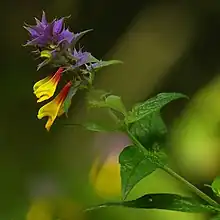| Melampyrum nemorosum | |
|---|---|
 | |
| Scientific classification | |
| Kingdom: | Plantae |
| Clade: | Tracheophytes |
| Clade: | Angiosperms |
| Clade: | Eudicots |
| Clade: | Asterids |
| Order: | Lamiales |
| Family: | Orobanchaceae |
| Genus: | Melampyrum |
| Species: | M. nemorosum |
| Binomial name | |
| Melampyrum nemorosum | |
Melampyrum nemorosum is an herbaceous flowering plant in the family Orobanchaceae. It is native to Europe. In Sweden it is called natt och dag. (Night and Day)[1] In Russia it is called Ivan-da-Marya. (Ivan and Maria) a Christianisation of the traditional Slavic Kupalo-da-Mavka (Kupalo-and-Mavka).
This is an annual plant. The new leaves are blue, turning green as they mature. They are usually toothed at the bases.
This plant is a host to the rust fungus Coleosporium melampyri [2] und Cronartium flaccidum with the associated uredium and telium.[3]
 Flower
Flower Flowers in yellow and red contrast the purple top leaves
Flowers in yellow and red contrast the purple top leaves
References
Wikimedia Commons has media related to Melampyrum nemorosum.
- ↑ Melampyrum nemorosum. Invasive Species Compendium. CABI.
- ↑ Peter Zwetko: Die Rostpilze Österreichs. Supplement und Wirt-Parasit-Verzeichnis zur 2. Auflage des Catalogus Florae Austriae, III. Teil, Heft 1, Uredinales. (PDF; 1,8 MB).
- ↑ Kaitera, J. and H. Nuorteva. (2003). Cronartium flaccidum produces uredinia and telia on Melampyrum nemorosum and on Finnish Vincetoxicum hirundinaria. Forest Pathology 33: 205–213. doi: 10.1046/j.1439-0329.2003.00321.x
This article is issued from Wikipedia. The text is licensed under Creative Commons - Attribution - Sharealike. Additional terms may apply for the media files.